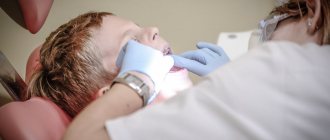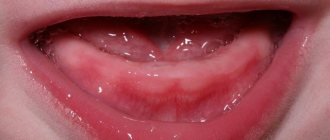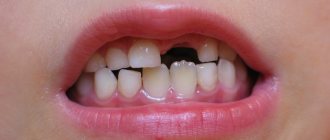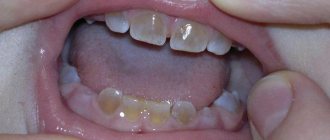The most difficult thing in dental treatment for children is persuading the child to go to the dentist. Fear of any manipulation of the body is a normal reaction. But if at a pediatrician’s appointment the intrusion into personal space is minimal, then at the dentist everything is different. How to persuade a child to go to the dentist and what modern approaches exist to solving this issue? Let's look at it below.
Types of child reactions to dental treatment
The types of reactions listed below are not a professional psychological classification, but rather reflect the experience of a pediatric dentist.
- Conditionally normal reaction. The child fulfills all requests of the doctor and parents. Doesn't cry, doesn't scream, even when discomfort occurs, he behaves calmly.
- Closing in on oneself. The child does not comply with the requests of the parents and the doctor and remains silent. You may not be able to sit in a chair at all.
- Crying and hysterics. The child not only cries, but may call him names and try to hit the doctor and parents.
In the first case, treating a child is not difficult; these children can be given anesthesia and perform all manipulations. This is how children usually react to treatment after 7-9 years of age. They can already articulate their fear. If everything is explained to them correctly, there will be no problems with the manipulations.
In the second case, it is not always possible to carry out treatment, but you can try to establish contact with the child and introduce the child to the office.
In the latter case, manipulation is very difficult. If assistance is urgently needed, anesthesia or a visit to the maxillofacial department is required.
Union with a doctor
A problem with a child’s teeth is a common problem for parents, the child and the doctor. Each of the participants in the process has their own tasks. But the treatment will take place and proceed normally if we combine efforts, therefore:
- Try to tell your doctor all the necessary information. Not only about health, but also about the child’s character: what he loves, what he does, what he dreams about, how you usually agree with him.
- Often when a child resists treatment, parents really want to help the doctor, but if you see that your actions are not helping, then give the doctor the opportunity to find contact with the child himself. Take on the role of observer.
- Be prepared for the fact that the doctor, after discussing the treatment plan and cost with you, will ask you to leave him alone with your child. Please be understanding about this. Moreover, according to our research, this is a fairly effective way to overcome problems in a child’s behavior.
Modern view on dental treatment in children
Modern technologies make it possible to perform dental treatment in Minsk in your sleep. Most experts agree that the child should not be subjected to unnecessary stress, but that it is better to treat all the teeth at once under sedation. In most cases, the child no longer needs to be persuaded for hours. While the child is sleeping, the doctor treats all teeth that need sanitation.
Advantages of dental treatment under anesthesia
- absence of stress and psychological trauma for the child;
- the opportunity to treat teeth with high quality;
- treatment is quick;
- You can perform all manipulations in one go: from treatment to removal.
Modern anesthesia drugs are absolutely safe for health; they are intended for short-term effects. During treatment, an anesthesiologist must be present to provide sedation. On the eve of dental treatment under sedation, the doctor will definitely collect an anamnesis to find out all possible contraindications.
In a dream, you can now both insert teeth and remove teeth .
Why is a child afraid to have his teeth treated?
When you meet with a dentist, the work of the central nervous system (CNS) changes: a chain reaction starts - the brain converts sound and image into an alarm signal. And then the signal is fixed in memory. When the situation repeats, the body begins to react accordingly even to the kindest dentist - the heartbeat quickens, sweating increases.
It is noteworthy that all children are afraid of pain. However, from the age of three, children develop fear of the sight of blood. Another reason why a child is afraid to have dental treatment is the fear of unfamiliar people and surroundings.
How to prepare your child for his first visit to the dentist
If parents want to do without anesthesia, it is worth preparing the child for the first visit. It is important not to frighten your child with doctors or dentists. If, in case of disobedience, you scare your child every time by going to the “scary” doctor, you should not be surprised at the hysterics and tears. You can talk in a playful way about how you will be examined by a doctor and treated.
On the first visit, it is advisable not to undergo any manipulations other than examination. The child should become familiar with the doctor and the office environment so that being in the doctor's office does not cause stress. It is important that the child is accompanied by an adult who is not afraid of dentists. Children are sensitive to the psychological state of an adult. If treatment is necessary, it is better to start with the least invasive procedures. For example, if deep fluoridation, teeth cleaning, fissure sealing and caries treatment are needed, it is better to start with teeth cleaning and fluoridation. The child will understand that there is nothing scary and will get used to the doctor and the office. Subsequent treatment will be perceived as normal.
Why are children afraid of dental procedures?
All phobias are based on negative experiences, or rather, experienced negative emotions. They are the ones who make children fear doctors - people in white coats. If dental treatment for children has ever been accompanied by unpleasant sensations, if the dentist does not have the necessary professional and psychological skills to treat young patients, the process of developing dental phobia will be launched.
There are a number of factors that contribute to its consolidation. Very often they are explained by the incorrect behavior of close people around the child.
- The emotions of mom and dad are quickly transmitted to kids. If they themselves experience fear or even just noticeably worry before a visit to the clinic, the child will definitely remember this feeling and take it into account.
- Some parents exploit emerging dental phobia for their own purposes, scaring their daughter or son with dental procedures: “If you don’t listen, let’s go to the dentist and let him treat your tooth.”
- Children with certain psychophysiological characteristics are very frightened by the unknown. A child with a soft, indecisive character will be afraid of his first trip to the clinic simply because he does not know what exactly awaits him there.
The value of the individual sensitivity threshold also matters. Adults and children with a low pain threshold will experience severe pain even from the most ordinary manipulations, causing other people only mild discomfort.
What to do if your tooth hurts?
When a child has a very painful tooth or swelling, treatment should not be delayed under any circumstances. If all attempts to persuade the child to undergo treatment fail, treatment under anesthesia is necessary. In the event that parents are categorically against sedation or it is not possible to carry it out, they have to go to public clinics or the maxillofacial department. While the dental surgeon performs all the manipulations, one or two nurses hold the child. This approach is considered outdated because it can cause psychological harm. This method may be justified in rare cases of health hazard, but it is better to avoid it.
Don’t forget about caries prevention, follow the rules of oral hygiene, and go to the doctor for examinations at least twice a year. Take care of your child's teeth.
Parenting during treatment
Many parents want their child to make an extremely favorable impression on others. And therefore, if a child, in their opinion, is doing something wrong, they immediately begin to educate him.
According to doctors, such an attitude towards a child in the office can negatively affect his behavior during treatment.
- There is no need to raise a child during treatment unnecessarily. Still, he is so excited that he is unlikely to pay attention to you. Before you pull your child away in the office, ask your doctor if your child is doing anything inappropriate. Maybe this is allowed.
- Comparing a child with other children also usually does not bring the desired results. If you compare a child with someone else, he feels that he is not loved for who he is. Comparisons are only permissible with himself. For example: “When you were younger, you really liked coming here.”
An individual approach is important here:
If your child is timid, quiet and obedient, especially with strangers. Give him complete freedom in the office. Under no circumstances should you pull him back: “go there; say thank you; wipe your nose”, etc. With such a character, he is unlikely to do anything inappropriate. If the child does something wrong, the doctor or assistant will tell him about it. By limiting the freedom of a shy child, it will be very difficult to form a trusting relationship with him. And trust is the key to successful treatment.
If your child is mobile, active, feels at home in any unfamiliar room, and does not distinguish other people's things from his own. Such a child must be restricted in the office. When entering, explain the rules of behavior to him. Along with what not to do, it is necessary to say what can be done. In order for the child’s great interest and need to move to be realized.
The fight for health
The child cries, does not want to sit in a chair, refuses to comply with adults’ requests, is restless, bites, or simply remains silent and does not talk to anyone. All this prevents the doctor from fully providing treatment.
What should a parent do?
It is clear that you really want the treatment to take place. And you are trying with all your might to help the doctor persuade the child to open his mouth. But this strong personal involvement can create problems. Therefore, to begin with, give the doctor, as a more independent person, the opportunity to come to an agreement with the child himself. Wherein:
- do not try to control the child in this situation;
- do not indulge the child, do not beg him, do not beg on your knees. According to doctors, this parental behavior makes the child uncontrollable;
- do not intimidate or threaten the child so that he stops resisting the doctor. Even if this has an effect, it is short-lived. The child quickly begins to behave in the same way and continues to be afraid of the doctor.
Before you do anything, try to understand what the child is thinking and feeling right now. How does this situation look from his side?
- Help your child understand during treatment what he is feeling: where the unfamiliar sounds are coming from; what he can feel.
The main goal is for the child to have as many intact teeth and a correctly formed bite as possible. And it’s not that he sits down in a chair at the moment and opens his mouth. This means, first of all, the child’s trust must be won as the basis for stable positive interaction.
Let the child get acquainted with the doctor, assistant, and office environment. Learn how different tools work. He will try to control them himself.
The most important thing is to maintain positive memories of the doctor and treatment. Even if it was not possible to do anything that was planned, the child should leave the doctor in a good mood, and not with a feeling of guilt and the feeling that he is bad.
Features of treatment for children
Practice shows that a young patient tolerates visits to doctors more easily when the medical staff treats him with respect. Therefore, an experienced doctor always devotes enough time to establishing contact with the baby. A dental examination of children begins with the doctor creating a comfortable psychological atmosphere and trying to make friends with the patient. Sometimes preparation for the treatment process occurs in three stages:
- The first visit is to establish contact and examine.
- The second day is hardware cleaning of children's teeth and x-rays, if necessary.
- The third visit is the actual treatment of a baby tooth under anesthesia.
With the use of the modern method of computerized local anesthesia, going to the dentist should no longer be scary. In some cases, the doctor decides on treatment using the xenon sedation method. Short-term sleep does not have side effects and makes it possible to simultaneously treat several diseased teeth.
If you prepare in advance and have a positive attitude, your child’s visit to the dentist will be successful. In cases where parents are unable to help their daughter or son overcome fear, it is recommended to consult a psychologist. An experienced specialist knows about all effective methods of overcoming fears.
How to overcome dental phobia
If you don’t know what to do in a situation where a child is afraid of the dentist, then you should listen to a number of expert advice:
- Start visiting the dentist from the first year of life. Do not think that only molars require treatment. After all, the subsequent formation of molars depends on the correct development of baby teeth. It is important to monitor the condition of the oral cavity from the first days of birth. Therefore, you will need dental consultations from the cradle. And in the future, you won’t have to solve the problem of how not to be afraid of the dentist for children. After all, your baby will perceive the doctor as an assistant and adviser.
- Do not focus your child's attention on visiting the doctor. You should not once again remind your child that a visit to the doctor is scheduled for a specific date. It’s better to check it out during your next walk. The effect of surprise will allow the baby not to fully understand what is happening and not feel fear.
- Choose the right time for your visit. If you decide to come to the doctor early, waking up your baby earlier than usual. Or made an appointment during your lunch nap. If a visit to the doctor is planned instead of a trip to the zoo or entertainment center. If you had to postpone your long-awaited trip to the sea for a scheduled visit to the doctor. Be prepared that your child will develop a negative attitude towards such an event.
- Consider a reward system. Some parents, when looking for a solution to the situation of what to do if their child is afraid to have their teeth treated, resort to the option of placating their child with expensive purchases. However, this is not recommended, since on the one hand, a strong perception is formed that you can only get what you want by going to the doctor’s office. On the other hand, for a child such a visit is associated with additional stress. After all, he understands that parents will not just give money or gifts. This means that serious “tests” await him in the doctor’s office. It is better to suggest that after a visit to the dentist, take a walk to your favorite park, go on rides, and get some kind of souvenir in the doctor’s office. Such a visit should be associated with positive emotions and the exclusivity of the event.
- Set an example. It is important to remember that visiting the dentist for preventive purposes is recommended not only in childhood. Parents should also visit a doctor. And you can do this together with your son or daughter. Show that mom and dad also go for preventive examinations. This will relieve unnecessary fears and allow the baby to feel like an adult, which is very important at the stage of growth and development.
- Accompany your child. Do not leave your child alone in the doctor's office. This applies not only to situations where a tooth needs to be filled or pulled out. Be present during every appointment. This will allow the baby to feel supported and gain confidence.
- Turn your visit to the dentist into a game. You can take your favorite toys with you or buy a children's set of oral hygiene tools. Continue the game at home so that the child at the dentist’s appointment does not think about the treatment process, but perceives what is happening as part of the exciting activities.
- Tell stories. Buy books where the kind Aibolit helps the heroes cure their bad teeth, or the Tooth Fairy grants wishes and gives amazing miracles. Let your child become the hero of one of these fairy tales during a visit to the dentist.
- Find options to shift your attention. Ask the doctor to turn on an interesting cartoon, or tell a fairy tale or funny story yourself while the baby is in the dentist’s chair.
- Visit one doctor. Let your child get used to the doctor. After all, by trusting a child will be able to cope with fear faster.
- Talk to your child. Explain to your child why to visit the dentist. Tell us that if you regularly check the condition of your oral cavity, you can avoid caries and the need to remove a tooth. Motivate your child for preventive examinations that will maintain oral health.
- Schedule an orientation visit. There is no need to wait until your teeth hurt or your bite needs correction. It is better to include a visit to the dentist in the plan of important events without any special reason. In this case, the child’s first visit to the dentist will not leave associations with pain and other unpleasant manipulations in his psyche. After all, it will just be an inspection. And subsequent visits will form a clear understanding that visiting the dentist is a habitual activity that is not associated with painful sensations.
- Build independence. Encourage your child to manage his or her own schedule for visiting the doctor's office. Explain why this needs to be done every six months. This way, the baby will be able to feel like an adult who has been entrusted with the responsibility for monitoring his health.
- Don't cause problems. For parents, this advice should be basic. After all, it is not at all necessary to wait until the child begins to complain of toothache or the problem arises of the need for professional teeth cleaning, bite correction, milk tooth removal, or gum treatment. It is better to prevent problems and eliminate them at an early stage. And then you won’t have to think about the question of why children are afraid of the dentist. After all, a visit to the doctor will become as common as visiting a kindergarten, a visit to a hairdresser or a tutor.
And, of course, look for your dentist. After all, if a child is afraid to pull out a tooth, then this is quite natural and justified. Not every adult is ready to undergo such a procedure without fear. But in the case when a child becomes nervous, irritable, and capricious before each visit to the dentist, then you should think about the qualifications of the specialist you are visiting.
How to persuade a child to go to the dentist if he doesn’t want to or is afraid?
The right choice of clinic and doctor is of great importance, because a specialist who has found contact with the child is able to distract him from possible unpleasant sensations and put him at ease. If this doesn’t work out for you, you will have to persuade your child to go for dental treatment on his own.
- Promise him to fulfill any desire after the visit to the doctor: let it be a walk, shopping, or watching more cartoons. However, this should not look like bribery - such behavior by the parent will alert the child even more.
- Motivate your child with a role model, even if it is his favorite actor or singer - pay attention to how good his teeth are, or even find real information about his idol’s visit to the dentist.
- Ask someone who is authoritative for him to talk about dental treatment with your child - an older friend, brother, sister or another person with whom he wants to look decent, whom he wants to be equal to.
- Children who are able to draw their own conclusions can be invited to an honest conversation about the condition of their teeth, the cause of their diseases and the consequences of lack of treatment - from aspects of health to the impact on communication with other people. Try to convey to your child the idea that the sooner he goes to the doctor, the easier and more painless the treatment will be.
If a teenager refuses to go to the dentist, and the situation is not critical, do not insist, postpone the conversation. Now the child is very vulnerable and any pressure, even for the good, can be perceived inadequately. Give him time to gather his strength and make up his mind.
In situations where sound arguments and small tricks do not help, and the child is terrified of going to the dentist, even realizing the possible loss of a tooth, it is worth contacting a child psychologist to work through dental phobia.
Where does the fear of going to the dentist come from?
There may be several explanations for the fact that a child is afraid to go to the dentist. For example:
- Meeting new people. A child's first visit to the doctor's office is just as stressful as the first day of kindergarten, for example. The child has to communicate with new people. Moreover, the interaction is quite close. And in this case, you can consult with a pediatrician on how to prepare your child for a visit to the dentist in order to take into account all the personal aspects of your child specifically.
- Fear of pain. For many, a visit to the dentist is associated with pain and blood, which is the main reason why even adults struggle with the decision to visit the dentist. It is important to explain to the child that now there are many modern treatment methods that make any procedure painless.
- Parents' conversations. You should not talk about your own dental treatment in negative terms in front of your child. After all, this can become another reason for children's fears.
- Psychological discomfort. It is important that the baby feels a positive attitude towards him from the attending physician. If the specialist does not inspire confidence, this will be one of the reasons that the child is afraid of visiting the dentist.
How to convince your child to go to the dentist when he has a toothache
The question of how to get a child to cure a tooth is especially relevant when the child experiences acute pain. For our part, it is important for parents to explain that the dentist will rid the teeth of evil microbes, catch evil Caries, etc.
As soon as the child crosses the threshold of the clinic, an experienced pediatric dentist will make every effort to awaken his curiosity. A young patient will probably be interested in a shiny instrument, a buzzing gun, buttons, the prospect of choosing the color of his fillings, etc.
Already on the spot, in the dental chair, the child is convinced that the treatment does not hurt at all: in good clinics they can quickly relieve pain with the help of local anesthetics, cooling the dental tissue and other methods. Modern dentistry employs psychologists who help the child adapt and perceive medical procedures normally.
And remember: if you initially go to a modern and reliable clinic, then every visit there will turn into a pleasant time with mom or dad.
What to do if a teenager is afraid to go to the dentist
A teenager trusts adults less, it is impossible to distract him and it is difficult to convince him of anything. You need to establish a trusting relationship with him and show respect for his choice.
It is advisable to follow these tips:
- Be sure to condemn all the procedures that have to be done so that he is not frightened by the unknown. Most fears go away after a detailed discussion of the upcoming situation.
- If a guy or girl refuses treatment and the situation is not urgent, do not insist on visiting a specialist. Familiarize them with the consequences of their refusal in detail and allow them to make a choice. After discussion, the teenager shows interest in treatment himself.
- Create positive motivation in your teenager for dental treatment and careful oral care. Explain to him the importance of healthy teeth and a beautiful smile for his future.
- Until the age of fifteen, you can always be in the dentist's office with your son or daughter and support him. If they are older, then the presence of parents is possible only with their consent.
- Choose a doctor who can establish good contact with the teenager. He must take into account the teenager’s opinion and communicate with him as an adult, and not just listen to the parents’ opinions and fulfill their wishes.
If you cannot cope with the situation on your own and the child continues to be afraid of the dentist, you should contact a psychologist. He will provide him with professional help and help him cope with fear.
“HOW TO OVERCOME THE FEAR OF GOING TO THE DENTIST IN A PRESCHOOL CHILD”
CONSULTATION FOR PARENTS
«HOW TO OVERCOME THE FEAR OF GOING TO THE DENTIST IN A PRESCHOOL CHILD»
Teacher-psychologist of the highest qualification. categories
MADO "Kindergarten No. 1 "Swallow"
Shpilevaya Irina Evgenevna
It is known that children’s teeth need special attention and proper timely treatment. If you do not pay attention and develop dental problems, there is a risk that the child will go through a negative (painful) experience, and then a visit to the dentist becomes a real test for the whole family, which can be overcome with a lot of effort. Some children, in order not to go to the dental clinic, are ready to cry, hysterical, just to avoid this unpleasant day of their moment. To avoid this, parents need to prepare their child in advance for the first visit to the dentist, because even the unknown can frighten him.
If a child’s fear of visiting a dentist arose after a negative experience due to a previous visit (in the case where adults showed violence - help hold the child during treatment), then the child may develop a pathological fear of dentists. How can we help a child overcome such fear?
First of all, it is necessary to determine the exact cause of fear and try to get rid of it. Let's look at the possible reasons below.
REASONS FOR FEAR OF THE DENTIST
In fact, there are not many reasons for fear of the dentist in children:
Ä negative experience of visiting the dentist - the child is afraid of repeating painful treatment: the first visit to the dentist is made when the child has a toothache;
Ä the unknown and going to a new, unfamiliar doctor;
Ä many children are frightened if the doctor immediately gets down to business and begins to examine the mouth. This is unexpected for a child. He perceives this as a rude invasion of personal space;
Ä
poor choice of doctor for your first visit to the dentist. Not all dentists are ready to seek an approach to children. Doctors at public clinics work on a whim - appointments are limited in time, they do everything quickly and efficiently, without friendliness or comfort. Pain during treatment leads to the formation of a persistent fear of dentists;
Ä unpleasant experience of communicating with doctors: if the doctor shouts, swears and gives orders, it is not surprising that the child ends up afraid of the dentist. In this case, it is better to change the doctor.
However, quite often, a child develops a fear of visiting the dental office due to mistakes made by his parents. These include the following situations:
Ü a child “gets to know” a dentist when he already has a problem with his teeth, for example, a tooth begins to hurt;
Ü Parents do not pay attention to motivation to undergo treatment. They don't tell you why you should go to the doctor or why maintaining your oral health is so important;
Ü violence is used in dental treatment, for example, a tooth needs to be filled, the child breaks free and has to be physically restrained in order to put a filling;
Ü the child comes to the doctor at an inconvenient time for him, for example, when he usually has a nap or is already tired;
Ü Parents deceive the child that the doctor “will not do anything,” but in fact a painful procedure awaits him. Therefore, when “the doctor will just look at the teeth” turns into a full-fledged treatment, the baby experiences a shock. In the future, it is no longer worth waiting for the baby to agree to come to the doctor voluntarily;
Ü Children also often begin to experience fear of the dentist because their parents set a bad example for them - if in the presence of a child, his father or mother is worried about the future treatment of a tooth or its removal, then parental anxieties will be passed on to the baby, who directly absorbs all this. Therefore, in order to avoid fear of the dentist, you should not talk badly about him, but on the contrary, thank him for the help that was previously provided to you.
Perhaps these are all the most common causes of fears in children, which develop in accordance with age. Having determined the cause of your child’s fear of going to the dentist, you need to begin ways to overcome it.
HOW TO PREPARE A CHILD FOR A VISIT TO THE DENTIST
To ensure that your child does not have any fear of dental treatment, pay attention to the following points:
:
Ä it is important for parents to find and choose “their” doctor among all pediatric dentists. Recommendations, reviews, and acquaintances will help. Talk to a specialist first, describe the child’s character so that he can find an approach to the child;
Ä you need to visit a pediatric dentist. After all, it is he who will be able to find an individual approach to a small patient, and this will allow him to treat or remove teeth almost painlessly and quickly;
Ä trust your baby’s health only to a specialist who has sufficient experience working with children;
Ä tell your child in advance and regularly about the need to take care of his teeth and visit the dentist. It is important to convey that visits cannot be missed, otherwise the situation may worsen. But do not use words like “more painful”, “worse”, “injections” and so on. Children are very afraid of such words, phrases and expressions;
Ä the first visit to the dentist is extremely important. If it is successful, the baby will not be afraid of such trips and will perceive the procedure normally;
Ä if you are planning to visit the dentist, under no circumstances should you reassure your child with the phrases “Don’t be afraid! It doesn’t hurt at all!” or “You’ll just have to be patient for a little while.” Even if the baby is not familiar with such a procedure as dental treatment, he still immediately develops fear;
Ä do not go to the dentist if you yourself cannot stop shaking in your knees. Children instantly read emotions and an initially fighting mood can turn into tears;
Ä arrange for your child to visit the dental clinic in advance. Explain that his teeth must be healthy, otherwise he will not be able to eat food. Tell your child that you are going to meet the dental wizard or tooth fairy. That they wear white coats, and the office is their kingdom. In this kingdom, children open their mouths, behave bravely and calmly. This is where real magic happens, your teeth stop hurting and become beautiful, white and straight. And then the child will begin to look forward to such a meeting;
Ä do not try to treat all your teeth at once.
Otherwise, the child will get tired and the experience will still be negative. This can lead to fear.
RECOMMENDATIONS FOR OVERCOMING FEAR OF THE DENTIST
If a child has already begun to be afraid of dentists, then fear needs to be dealt with consistently and carefully.
In order for the child to get used to visits to the dentist, it is necessary to carry out preventive examinations every six months, this will help reduce the persistent fear of the doctor.
Ä Confidential communication:
Sometimes, in order for a child to stop being afraid of the dentist, it is simply enough
to establish contact between the little patient and the doctor.
After all, fear exists only in front of faceless figures. The doctor should become an acquaintance for him who can be trusted. Then the child will be able to put aside all worries and allow the doctor to carry out all the necessary manipulations. Often children have difficulty establishing any contact due to communication problems. In this case, the child is not only afraid of doctors, but also of other people, with the exception of his parents. Then the fear can be very difficult to overcome, but, no matter what, it is real. To do this, the dentist himself must make a lot of effort. A stranger in a white coat with strange instruments and a mask is scary. A dentist who calls a young patient by name and clearly talks about the equipment and medical procedures inspires trust. An excellent bonus of professional children's dental clinics is adaptation techniques, where the child is introduced to the doctor's work and tools in a playful way. If possible, let the child choose the doctor he wants to go to. It's a matter of trust.
Ä Psychological preparation:
As a psychological preparation, play with your child: for example, invite him to play the role of Doctor Aibolit and treat his toy’s tooth. Let your child examine your teeth and give recommendations for proper brushing. Then switch roles and invite dolls and animals to the reception. Show that the animals are very happy about this game, do not fear doctors and receive gifts for their bravery. Then play out the situation of a visit to the dentist in advance, trying to paint this event in brighter colors. Children learn about the world by playing: first give him the right to choose a role, doctor or patient, and then switch roles. While playing, the child must understand that the doctor does not want to cause pain, but, on the contrary, helps to cure the patient.
oh tooth. This game will help prepare the child for various manipulations that are carried out in the dental office and will relieve him of fear and uncertainty;
Ä Motivation:
Many people don’t like material incentives, but sometimes they are necessary. If your child agrees to visit the dentist, then offer to fulfill any of his wishes. Encouragement should not be direct, but indirect: “The doctor will treat the tooth, and then we will go to the cinema.” If you financially reward children at every stage of treatment of baby teeth, they will very quickly learn to manipulate their parents and will beg for gifts for any actions that are unpleasant to them. If he begins to be stubborn and capricious, come up with a story about how a good doctor (tooth fairy) can make a child’s little dream come true during a visit to the dental clinic. Explain that once you treat his teeth, his wish will be granted by the good doctor (the tooth fairy). Buy a small gift and ask after the end of the treatment or examination that the doctor himself gives the toy to the little patient. This approach comforts, gives positive emotions, and helps fight fears for the sake of the desired gift. Gradually, positive behavior is reinforced - going to the dentist brings joy, not horror. This way, the baby will be able to associate the dentist with a person who brings joy and fulfills wishes.
Ä Psychological support
: It is very important to show the child that the parents are on his side, they support him. If you think that being in the office will help overcome fear, then insist on it. It's normal for dad or mom to hold the baby's hand. Under no circumstances should you shame, threaten or punish your child. It is important to voice the child’s feelings (“I understand that you are scared. I will be there. I love you. We will get through this together”). One way or another, we are all afraid of something, it does not depend on gender or age. There are dozens of phobias in the world, and your child got one. Praise your child before and after a dental visit. Say that you believe in him, that you support him, that you are proud. This is something that any kid will appreciate. And be sure to tell your grandmothers about your courage. Allow your baby to take his favorite toy with him to the appointment. And during the procedures, always remind them that you are nearby.
Ä Systematicity
: Go to the dentist all the time, and not when something hurts. Start with a casual introduction. If doctors are understanding, then they will not be confused by the desire of a young patient to look at instruments or touch a lamp. Tell them that the dentist is your teeth’s best friend. For clarity, you can even cartoon about the
Show the little guy whose teeth the bird was brushing “Bird Tari”
Ä Honesty
: Be honest with your child about where you are going and why. Psychologists distinguish between mother's and father's approaches when communicating with a child. Dad explains through logic, reason; mom - through emotions, feelings. Any path is correct. It is wrong to remain silent about the upcoming procedure, to deceive, to be cunning, to lure the child to an appointment, in the hope that they will not “get away.”
Ä Personal example:
Show your child by personal example, ask your child to accompany you to the clinic for a preventive examination. Go for checkups twice a year and talk about good impressions, new technologies and a pleasant doctor.
Ä Mode:
Before you plan to visit the dentist, make every effort to create maximum comfort for your baby so as not to increase stress. To do this, choose a convenient time so that the child is healthy, sleepy, well-fed, and in a good mood. If the child is tense, this situation will only get worse. In young children, psychological comfort is fully connected with physical comfort. Early morning and late evening are absolutely not suitable for visiting the dentist. Other intervals should be assessed from the point of view of children's routine, well-being, and comfort.
Ä No violence
: if the child agreed to go to the doctor, allowed him to be examined, but then started crying - pack up and leave. There is no need to increase his fear, twist him, hold his arms, legs, mouth along the entire corridor. Otherwise, this may be your last visit to the dentist.
Ä Red herring
: distract the child from the situation, ideally this should be done by a dentist. Let him explain all his actions, let him choose the taste and color of the filling. To avoid the desire to hold the doctor’s hands, put a bulky toy in them; it would be nice if it was one of your favorites or a new one. Some dental offices are equipped with a monitor, so the treatment will take place faster than your favorite cartoon can end (you can use your phone).
Ä Favorite characters
: “Send your daughter or son’s favorite cartoon or movie characters to the dentist.” Children love to imitate their idols, so stories about Superman, Pepe Pig or Luntik, who successfully survived treatment for caries of baby teeth, will have an encouraging effect on kids.
Ä Fairytale therapy:
Before visiting the clinic, tell your child or compose “dental fairy tales” with him - for example, about evil microbes that destroy teeth and the good doctor who defeats them. Stories like this put children in a positive mood. Tell a story from your own childhood. How did you go to get your teeth treated and weren’t afraid?
matologist. Remember positive stories from the life of your child’s friends or acquaintances. In addition, you can read therapeutic fairy tales to your child.
Ä Feelings:
with children aged 4–5 years, it is already possible to discuss what exactly caused their pain and fear - an anesthetic injection, drilling, the doctor himself, etc. In the process of speaking, fears are gradually repressed, and the frightening treatment process turns into a familiar event.
Ä Pain relief:
in some cases, you can ask the doctor to carry out treatment under local anesthesia. If the baby is bothered by acute pain and the teeth are severely affected by caries, then it is unlikely that they will be treated without anesthesia. Ask your doctor to use one of the pain relief methods - an application, in which a medicine is applied to the gum with a cotton swab, or an injection into the gum. And after some time (usually after a few minutes) the baby will not experience pain during treatment.
WHAT NOT TO DO
Ä Do not threaten or frighten your child by telling him that if he behaves badly, you will go to the dentist. This will instill mistrust in the dentist and increase fear even more. He will begin to perceive going to the doctor as a punishment, and not as an important and necessary stage in life.
Ä If a child does not allow his teeth to be treated or refuses treatment, do not shout or scare the baby. Screaming and swearing will frighten the child even more. Do not force your child to go to the dentist or forcefully hold him in the chair.
Ä Don't give up and continue to talk about the need for procedures, find the positive aspects and use the methods suggested above. This approach will one day work, and the child will agree to visit the clinic.
Ä Do not leave your child alone in the dentist's office. He needs to know that you are nearby. Support and encourage your baby while the procedure is going on. But do not interfere with unnecessary comments and instructions if the doctor has found an approach to the child and is working calmly.
The main steps you need to take with your child to overcome the fear of visiting the dentist:
1. Externalization of the problem
- externalization (for example, “Fear lives in you - it has subjugated you - you need to fight it and defeat it”). Ask him to draw his fear in detail. Does the sound scare you? Appearance? The wire? Find the scariest place. Perhaps you can exclude something (equipment, sound), remove it from view.
2. Desensitization
: against the background of physical relaxation, it is necessary to remember a situation in which it was scary in order to reduce psychophysical stress in a real situation. It is important to praise and notice even the slightest successes. I am proud of you, the fear is less and less, and you are becoming bolder and bolder!
3. Play therapy
– playing out fears in a game with taking on different roles. Very helpful! Treat teeth with toys, let the baby play both the role of a doctor and the role of a patient. In the game it is important to be creative, show imagination and be sure to be the winner of fear.
If you succeed in the game, you will succeed in life, this is proven by practice.
PSYCHOTHERAPY TALES
AGAINST THE FEAR OF A VISIT TO THE DENTIST
5 RULES OF FAIRY TALE THERAPY
1. If you have a son, let the main character be a boy, and if you have a daughter, let him be a girl. But it is better to leave the name of the hero fictitious, so that the child does not have the feeling that this is a story directly about him or his friends, because the heroes in these fairy tales do not always act well.
2. Add stories from your child’s life to fairy tales - this will make the plot more familiar and understandable to him.
3. Don’t make fairy tale therapy an activity. Tell a fairy tale when the child wants it: don’t push, don’t force, don’t insist.
4. After telling the story, discuss it with your child. Remember the plot again, ask what the child liked or didn’t like, ask his opinion: who did well and who did poorly, why the hero was happy or upset, how he felt, etc.
5. Invite your child to act out the plot of a fairy tale with toys or show him a puppet show.
No. 1 Fairy tale "Doctor Ethan"
Behind the distant seas, behind the high mountains, there stands a miracle - a city. It is built from a construction set and all the houses and cars, schools and shops, children and adults are made from construction blocks. Houses in this city are of different colors: residential buildings are blue, schools are green, hospitals are pink, fire stations are orange, police stations are black and white. Adults have their own beautiful shape. Teachers wear colorful clothes, firefighters wear orange and yellow, police officers wear black, and doctors wear white coats.
There lived in this city a boy, Ethan, who dreamed of becoming a policeman. He had a real little police car in his toys, and he imagined himself as a policeman who caught criminals.
One day Ethan got sick and his mom and dad took him to the doctor in white clothes. The doctor helped the boy, cured him, but Eten didn’t like seeing the doctor, he did something unpleasant to him, and the boy decided: “I won’t go to the doctors anymore, no way!!”
Time passed, the boy grew up, went to school, played, ate delicacies and sweets, and suddenly he felt that his tooth was hurting. Mom and dad took him to the doctor, only Ethan remembered his promise and did not open his mouth. So the tooth remained untreated. The tooth hurt and then stopped, but the boy endured it, refusing to go to the doctor.
Evening came and Ethan went to bed. And he had a dream that he worked as a doctor in a hospital. He is in a white coat and people turn to him for help. So he skillfully applied a plaster cast to the man’s arm; now he needs to measure his grandfather’s blood pressure; but a friend who had a toothache turned to him for help. His comrade is holding his cheek, tears are rolling from his eyes, it hurts so much. Ethan sat his friend in a chair and said:
- open your mouth.
- No I can not. I'm afraid you'll suddenly pull out my tooth...
- your tooth will remain in place. Only if my mouth is closed, how can I cure it? You know that teeth need to be treated, they grind food. And if your teeth are bad, then you won’t be able to eat sweets, chocolate, cookies, nothing! Trust me, I will cure your tooth. Doctors are helping.
It was scary, but the comrade opened his mouth, and Eten healed his tooth. I put a filling.
Morning came and Ethan woke up. I felt the sore tooth with my tongue. It hurts, it needs treatment. He remembered his dream. “The doctors are helping! And they will help me,” he thought.
Ethan asked his mom and dad to take him to the doctor before his tooth hurt at all. He sat down in the chair boldly and opened his mouth. The dental machine buzzed briefly and a filling appeared on his tooth. The filling was shiny silver. And the tooth became healthy. Strong, beautiful.
At school, Eten showed the filling to all his friends and the teacher. Friends were even a little jealous of the silver filling. And Ethan always remembered that doctors help.
No. 2 Fairy tale
“ The Tale of a Cowardly Hedgehog and a Bad Tooth ”
One day, a little Hedgehog who lived on the very outskirts of a forest clearing, where a big, big birch tree grows - well, you know - had a toothache. Indigenous, the farthest. He had never had toothache before. The milk ones fell out by themselves, new ones grew to replace them, and everything was fine. And this tooth suddenly became capricious and got sick.
The hedgehog did not say anything to his mother. I thought: nothing, I’ll be patient a little, it will go away on its own. He only told his best friend, Belchonok, about this.
- What you?! - Belchonok immediately exclaimed. – You need to urgently treat this bad tooth!
The hedgehog was silent for a while, then admitted:
“You know, if I tell my mom about this, she’ll take me to the doctor, and I… I’m a little scared.”
-What are you afraid of? - asked Belchonok.
– I’m afraid that treating the tooth will be painful.
“Ah-ah, I see,” Hedgehog’s best friend smiled. - I
I used to be afraid of this too. And then he stopped. And do you know why?
- Why?
– Yes, it turns out that now doctors treat teeth without pain at all.
- Quite quite? – Hedgehog was surprised.
- Quite quite! - Belchonok confirmed. - Well, it doesn’t even hurt at all, not a bit. But if you don’t go for treatment, you may be expected to... what is this word called... my mother said it. Oh, I remembered: big problems can await you!
And Belchonok told the Hedgehog a story about his grandfather. He also somehow had a toothache, but he did not go to the doctor, but decided to get treatment himself. I made an infusion of fir cones, added some herbs and roots, and began rinsing my mouth. So, it turns out, the old Owl taught him. Well, I rinsed and rinsed, but the teeth did not go away - they hurt. When he finally made up his mind and turned to a doctor for help, it was too late: the teeth had to be removed. And if he had come to the clinic on time, his teeth would have been fixed, and everything would have been wonderful.
“And now my grandfather can’t bite the delicious nuts,” Little Squirrel sadly finished his story. “My mother and I have to do this - we have healthy teeth, because we take care of them, brush them with toothpaste every morning, and if they get sick, we immediately go to the doctor. Now we crunch nuts for grandpa, and he eats the grains.
The Hedgehog thought for a while, and then asked Belchonka:
– Weren’t you scared at all when you first went to the doctor to have your teeth treated?
The little squirrel answered honestly:
- Well, it was a little scary, of course. But only the first time. And when I realized that it didn’t hurt at all, the doctor and I even became friends. He's called a dentist. And now I’m not at all afraid of him, because he’s very kind.
The hedgehog believed his friend and that same day he told his mother about his bad tooth. The next day she took him to that same kind doctor - a dentist. He sat his little prickly patient in a special chair, took out special instruments and began to treat the tooth.
The hedgehog was still afraid for some time, he kept waiting - it would hurt or it wouldn’t. But, to his cheerful surprise, he did not feel any pain. And the very next day I felt completely healthy.
Of course, he immediately ran to his friend Belchonok and told him about it. Don't forget to thank you for your good advice. And they again began to play together and jump over the fallen tree. And they even held a competition: who could quickly crack delicious nuts for Grandfather Belchonok.
Since then, Hedgehog has never been afraid to go to the good dentist.
No. 3 Fairy tale “About the cat who was afraid of the dentist”
Once upon a time there was a cat who was very afraid of the dentist. Her tooth was half black. And mom said: “Tomorrow we will go to treat your tooth.” And the cat answered: “I don’t want to, I won’t.” More than anything else, the cat loved watching cartoons and eating candy, but sometimes she forgot to brush her teeth. Mom had to take extreme measures to save her daughter’s tooth. She said: “So you won’t watch cartoons or eat candy anymore.” The cat cried.
A week has passed. The cat was sad and bored. And the tooth began to hurt often and before it was half black, but now it’s all black. And the second tooth also began to deteriorate, because neighboring teeth infect each other with caries. Mom finally asked: “Well, are we going to the dentist?” The cat cheerfully and happily said: “Yes!” The cat was very afraid that soon all her teeth would turn black. She also wanted to watch cartoons in the dentist's chair. They got into the car and drove off... The dentistry was called Megadenta. As soon as they entered there, they were greeted by the tooth fairy, she played with the cat, and together they drew a card for mom. The cat was no longer so scared. She couldn't wait to get into the dentist's chair. And the doctor called her into the office. She quickly ran and sat down in the chair. They turned on her favorite cartoon about three cats.
Aunt cat, the doctor, brought a special mask for her nose with the smell of ice cream. This magic mask helped the little cats relax a little and not think about bad things. The cat was happy because she hadn’t eaten ice cream for a long time.
Treatment began. The cat was not in pain at all; she was given a magic injection that froze the tooth so as not to experience any discomfort. She suffered a little and watched the cartoon, it was very interesting. When her tooth was treated, they gave her a cute plush cat. And the cat was very happy. And at home, the cat again began watching cartoons, eating candy, and never forgot to brush her teeth immediately after candy. Zubik no longer hurt. Then my mother said: “Because you were so brave and cured the tooth, we will go to the store and I will buy you everything you want!”
There were a lot of toys in the store: cars, plush cats, squishies, a skateboard. Even the cat's eyes widened. And she chose a skateboard and immediately went outside to ride.
At home, the cat admitted to her mother that she really liked treating her teeth, but all her teeth were already healthy and she said: “When I grow up, I want to become a kind dentist myself, who treats teeth, gives gifts and shows cartoons!” Mom replied: “What a great fellow you are! Brave girl! I love you very much!" The cat hugged her mother and said: “And I love you, mom!”
One day, the cat had a terrible dream, as if she again did not agree to have her teeth treated, put on a magic mask and sit in the dental chair. In the dream, all her teeth became black. They were very scary and hurt. And my mother said in a dream: “We need to tear them all out!” The cat didn’t want to be left without teeth at all. She woke up in horror. She was scared. She ran to look in the mirror. The cat saw one small hole in the tooth.
Mom was sleeping in the meantime. The cat tried to wake her up: “Get up!!!” Mom woke up and said: “What happened?” The kitty shouted impatiently: “I only have a tooth with a hole!” Let's go to the dentist! Otherwise I dreamed that all my teeth turned black!”
Mom called on the phone and agreed with the doctor that they would be seen in a week. The cat said all week: “I wish I could cure this tooth soon, otherwise everyone will get caries from it.” She looked in the mirror and was afraid that all her teeth would turn black as if in a dream.
And then the day came when the cat and her mother went to the dentist. The cat was very happy and wanted to get her tooth fixed as soon as possible. She was given a magic mask, this time with the smell of Coca-Cola. And the tooth was quickly cured. Then they praised how well done she was for asking to see the dentist herself, in a timely manner, before the caries spread further. The doctor said that she would set the cat as an example for all the other children. And then I gave her a gift.
Mom also gave the cat a gift for the cured tooth. The kitty removed the packaging from the gift and it turned out to be a brand new phone on which you could play different games. The cat’s favorite game has become caring for a virtual pet in the form of a tooth: cleaning it and treating it.
Mom and kitty were very happy that they managed to cure the tooth and the others did not become infected with caries.
No. 4 “The Tale of False Fear”
(a fairy tale for children with fears)
Once upon a time there lived a little tiger Ava. He lived with his parents in a cave deep in the forest. Dad got food, and mom worked in a forest school, teaching the forest inhabitants wisdom.
One day, when his parents went out on business, Ava was left at home alone. He curled up on the soft, fragrant hay and decided to take a nap. And just as he began to fall asleep, something suddenly rumbled terribly outside the cave. The earth shook, stones fell from the ceiling, a bright light flashed, the forest rustled, the trees creaked.
The tiger cub was more scared than he had ever been in his life. Horror filled the tiger cub, he trembled from helplessness and despair, and thought that the terrible monster that his grandfather had told him about was coming towards him. Terrible thoughts came into his head. He felt like a huge monster was approaching his house, which was about to grab him and drag him into its hole. The tiger cub was waiting for his death, when suddenly everything became quiet. The parents returned soon. The tiger cub rushed to them and told them about what had happened.
The parents laughed and said: “All this is nonsense, fiction. It was just the heavy rain that scared you.” Ava talked to her parents and listened to them. Only from then on did he become afraid to be alone. So that huge monster stood before my eyes. When the parents were about to leave in the morning on business, Ava shouted: “Don’t leave, I’m with you!” He grabbed onto his parents, what can you do? Mom and Dad had to invite an owl nurse to look after their fearful son.
For a long time, Ava’s parents endured Ava’s fears; they tried with all their might to convince Ava that there was nothing to be afraid of, but persuasion did not help. Then they invited learned doctors. But none of the forest healers could cure Ava.
The parents have almost come to terms with the fact that the tiger cub will be afraid all his life. But one day a mouse ran into the cave. She wanted to enjoy the goat's milk that her mother brought every morning. While the nurse owl was sleeping, the mouse ran deep into the cave, and was just about to drink milk when it saw a sad tiger cub.
- Why are you so sad? - asked the mouse.
- I'm afraid to be alone. – Ava answered sadly. “I’m afraid that a monster will come and take me into its hole.”
The mouse was surprised and said:
“You’re so big, but you’re afraid of the monster.” They don't exist. It was the old thunderstorm that frightened you. - The mouse laughed. - Look at me. I am so small, everyone can offend me, many dangers await around, but I bravely overcome them. And now I slipped past an owl that could have eaten me. Every time I overcome my fear and become even more courageous and strong. After all, strength lies in the ability to boldly move forward despite your fears. Do you want to become strong? - asked the mouse.
- Yes, sure. - The tiger cub answered.
“Then don’t hide in the cave.” Come on, I'll show you the world.
A tiger cub and a mouse sneaked past a sleeping owl and ran out into the forest. And in the forest it was a warm sunny day, birds were chirping, bees were buzzing. And it seemed as if that terrible thunderstorm had never happened. And the tiger cub has already forgotten about the inventions about the monster. He just asked the mouse:
“If it wasn’t a monster, then what was rumbling around?”
- It was the thunder that scared you. - The mouse answered.
“What sparkled so brightly?” Ava continued.
— It was lightning that lit up the sky. - The mouse suggested.
- What was making such a mysterious noise and creaking?
“It was the trees that bent under the gusts of wind.”
Then Ava realized that he was afraid of something that actually didn’t happen. He thanked the mouse and ran to the clearing to play with butterflies and collect a bright bouquet of flowers for his parents.
Now he felt simply wonderful. And he really liked that he was able to overcome fear and become a real brave tiger. Now, when the thunder began to rumble, he just smiled, waiting for the fresh summer rain, which would bring coolness and a pleasant damp smell.
No. 5 Fairy tale “How Tom the crocodile stopped being afraid of the doctor”
Tom the crocodile, when he grew up a little, stopped being afraid of doctors altogether. Now he looks at the kids - how they cry, how afraid the doctor in a white coat is - and remembers himself. He always reacts to the doctor very, very calmly. Sometimes he even smiles at him. And of course, it shows the belly, teeth, throat and even the tail. Although he rarely sees the tail himself. But for some reason the doctor is very interested in the tail. “Nice tail,” says the doctor. “Just an excellent tail.”
And before, Toma would come to the zoo clinic and start crying right in the lobby. They haven't entered the door yet. And he is already crying. “Dad, mom,” he shouts, “I don’t want to go to the doctor.” Save! Help!" He thought that doctors were evil and, most importantly, unceremonious.
- “Come on, baby, open your mouth, stick out your tongue, let me pick your ear with my finger and feel your ribs.”
And then Tom realized that this is what doctors do. Make sure the kids are healthy. And we never got sick. No, the animals, of course, still get sick. But not as sick as they would have been if there were no doctors. They are not very sick. A little. To improve immunity. Snot drips from the nose, called a runny nose, and the next day you are already healthy - you can go for a walk or to the children's zoo.
I remembered Tom the crocodile and the vaccinations, injections, and how they took blood for tests. And he frowned. This is really not very pleasant. But the doctor then looks at Toma’s chart and says: “Wow, the tests are good. Your child is absolutely healthy." And Papa Crocodile laughs joyfully. And he pushes the crocodile mother in the side - you see what a good child we gave birth to. And Tom is also happy that he made Mom and Dad happy.
- Baby, - by
he reached the crying hippopotamus, “don’t worry.” The doctor is kind. He will cure you. And don't be afraid of injections. They are all done for your benefit.
The baby hippo listened to Tom and cried even louder. “Ah-ah-ah-ah, I don’t want to, it hurts.” Stupid, tiny, does not understand how important it is that doctors regularly examine animal children and help them be healthy, cheerful and happy. This is their job. Good job.
One day Papa Crocodile asked Tom: “Don’t you want to be a doctor yourself when you grow up?”
- I?! - Toma thought. - Well, nooo.
- Why, Toma? - Mom asked. - This is wonderful. You will treat animal children. And the salary is good.
“I’d rather drive a tractor,” Tom said seriously, “or a steamboat on the river.” In the meantime, my job is to go to kindergarten. And be an obedient and sweet child there.
- And you do a great job! - Papa Crocodile confirmed.
“Okay,” said mom, “we forgot, we need to give one more injection today.” In the second office. On the second floor.
- Don't want! - Toma shouted out of habit.
- What, you don’t want to be healthy? Or scared?! - Papa Crocodile was surprised.
And Tom himself began to roll up his shirt sleeve: “Let’s go.” I'm a boy. I'm a future man. Necessary means necessary.
- I'm proud of you, Toma! - said mom.
And Dad simply shed a stingy crocodile tear of pride for his son, who is so grown up and is no longer afraid of doctors at all.











